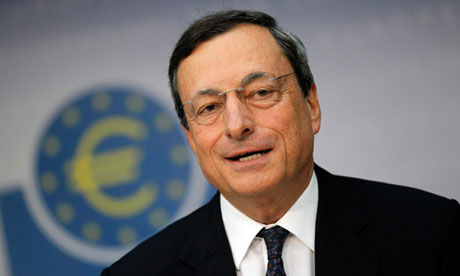Central bank governor Mario Draghi overcomes Germany's fears over inflation to announce new intervention in debt markets

ECB president Mario Draghi was careful to address German objections in his presentation of the unlimited bond-buying policy. Photograph: Alex Domanski/Reuters
The European Central Bank unveiled its boldest attempt yet to stabilise the battered single currency on Thursday when its president, Mario Dra ghi, announced a new programme of open-ended, unlimited buying of distressed government bonds.
The scheme is aimed at depressing the costs of borrowing for Spain and Italy. But Draghi also set strict terms for triggering the bond-buying programme – terms which put pressure on the eurozone's political leaders to request help, enter austerity programmes, and agree on direct bailouts for struggling governments before the ECB will act.
Draghi brushed aside strong resistance from Germany's powerful Bundesbank, which lodged the only vote against the new policy in the ECB's 23-strong governing council, to come good on his pledge in London in July that the central bank would do "whatever it takes" to save the euro.
The new bond-buying scheme, to be known as outright monetary transactions or OMTs, means that the ECB will intervene in the secondary markets to buy up the debt of governments whose bond yields are too high and are therefore jeopardising the uniform conduct of monetary policy across the eurozone, Draghi said.
The purchases would apply only to short-term debt of up to three years. The countries benefiting from the help would first need to request a eurozone bailout and governments in the single currency would need to decide to use the bailout funds to lend directly to struggling states.
Draghi said he could not order the participation of the International Monetary Fund, but would strongly seek it in any future bailout programmes.
Spanish and Italian 10-year borrowing costs fell to three- and five-month lows following Draghi's announcements.
"A necessary condition for outright monetary transactions is strict and effective conditionality attached to an appropriate European financial stability facility/European stability mechanism [bailout]," Draghi said.
"Such programmes can take the form of a full EFSF/ESM macroeconomic adjustment programme or a precautionary programme, provided that they include the possibility of EFSF/ESM primary market purchases," he announced. "There is no ex ante quantitative limit to the interventions."
Draghi said that the interventions could be halted if they were seen to have been successful in curbing the cost of borrowing, and also suspended if the country benefiting from the help breached the terms on which it received it.
The Bundesbank has argued that a bond-buying programme would be tantamount to direct financing of governments, which is proscribed by the ECB's statutes.
But While Germany's central banker, Jens Weidmann, has been a vocal monetarist hawk in the contentious debate leading to Thursday's move, the other German in the ECB governing council, Jörg Asmussen, played a key role in drafting the new policy. The government in Berlin has mounted minimal resistance to the new ECB policy.
The OMT initiative is the third time since the spring of 2010 that the ECB has intervened in this way, first buying up Greek debt in May that year, then mounting an unsuccessful attempt last summer to relieve the pressure on Rome by buying Italian debt.
These two previous attempts are viewed as having done little to contain the euro crisis. This time, Draghi said, "it will actually work."
The reasons he cited were the strict terms attached to receiving assistance; the decision to forgo the ECB's status as a senior creditor and take equal ranking with other creditors; and because the bond-buying would be restricted to short-term debt.
Although having overcome the Bundesbank's resistance, Draghi emphatically argued – in terms clearly aimed at assuaging German objections – that the new policy was fully in line with the ECB's fundamental monetary policy remit.
He repeatedly stressed that the aim was to "repair monetary policy transmission channels". He laid out analysis stressing that inflation risks in the eurozone were low over the next two years, and emphasised the tough terms that would need to be observed to qualify for the aid. All ECB bond-buying will be "sterilised" – that is, offset by removing equivalent liquidity from other parts of the euro system – to counter inflationary risks.
Spain is the strongest candidate for becoming the first beneficiary of the new programme. But following talks in Madrid on Thursday with Chancellor Angela Merkel, the Spanish prime minister, Mariano Rajoy avoided all talk of whether Spain would request a bailout.
It remains unclear how and when the new policy will be implemented. Madrid will be hoping that the very notion of unlimited ECB purchases might be enough of a deterrent in the markets to depress Spain's borrowing costs, avoiding the need to ask for a bailout.
The opposite scenario is that now the markets will now test the intentions outlined on Thursday, forcing Spain into a eurozone bailout and ECB support.
The plans unveiled, as well as the commanding manner in which it was delivered, have burnished Draghi's growing reputation as the most impressive performer in the long-running euro crisis, putting Europe's political leaders in the shade.
Anda baru saja membaca artikel yang berkategori News
dengan judul ECB introduces unlimited bond-buying in boldest attempt yet to end euro crisis. Anda bisa bookmark halaman ini dengan URL http://portalsolo.blogspot.com/2012/07/ecb-introduces-unlimited-bond-buying-in.html. Terima kasih!
Ditulis oleh:
Unknown - Sunday, July 15, 2012
Belum ada komentar untuk "ECB introduces unlimited bond-buying in boldest attempt yet to end euro crisis"
Post a Comment